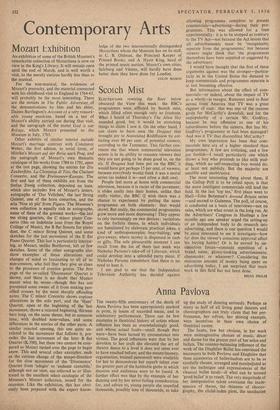Scotch Mist
ELECTRICIANS rewiring the floor below obscured the View this week : the BBC's programmes were afflicted by Scotch mist, which lifted often enough only to frustrate. What I heard of Thursday's The Alien Sky sounded good, but it would be stretching things to claim I saw it. On the other hand, I can claim to have seen the Dragnet that brought joy to Associated Rediffusion by col- lecting over 80 per cent. of potential viewers, according to the Tammeter. This further con- vinces me that where commercial television scores is in its ability to reassure viewers that they are not going to be done good to, on the sly. If Dragnet had been put on the BBC it would have got perhaps 15 per cent, of viewers, because everybody would think it was a moral series (as indeed it is—and often a dull one).
People feel more at home with commercial television, because it is racier of the pavement; it slides easily into their homes, unlike that stuffy visitor, the BBC (I wish there was a chance to experiment by putting the same programme on both channels: that would show). But really, the commercial programmes grow more and more depressing! They appear to rely increasingly on two devices: variations on the forfeits theme, in which individuals are humiliated by elaborate practical jokes, a kind of anthropomorphic bear-baiting;' and give-aways. where money is dispensed in cash or gifts. The sole pleasurable moment I can recall from the lot of them last week was Nicholas Parsons's take-off of Liberace, which could d6telop into a splendid party piece, if Nicholas Parsons remembers that there is no need to ham it.
I am glad to see that the Independent Television Authority has decided against allowing programme comperes to present commercials—advertising--during their pro- grammes. This was allowed for a time experimentally : it is to be stopped as contrary to the TV Act—not because the Act insists that all advertisements must be 'recognisably separate from the programmes,' but because viewers might think that 'the programmes themselves have been supplied or suggested by the advertisers.'
I would have thought that the first of these arguments against was the stronger—particu- larly as in the United States the demand to keep commercials and pr'ogrammes separate is at last becoming effective.
But information about the effect of com- mercials—or indeed, about the impact of TV as a whole—is meagre. Rumours used to float across from America that TV was a great exposer of cant : this was one of the reasons given for McCarthy's downfall, and for the unpopularity of a certain Mr. Godfrey, because he was offensive to one of his subordinates before the camera. But has Mr. Godfrey's programme in fact been damaged? And was it TV that discomfited McCarthy?
My own impression has been that com- mercials here are of a higher standard than programmes. A few are irritating, and a few are foolish—I recall particularly one which shows a boy who pretends to like milk 'pud- ding, which no self-respecting boy would do; at least not publicly. But the majority are sensible and unobtrusive.
The most interesting thing about them, if the Gallup Poll is to be relied upon, is that the more intelligent commercials still lead the field. In the last 'top ten,' first place went to Shell—John Betjeman's Around Britain series —and second to Guinness. The poll, of course, is conducted on a basis of interviews—not on sales, which are what count in the lorig run. At the Advertisers' Congress in Hastings a few months ago one speaker urged the setting-up of an independent body to do research into advertising, and there is one question I would he most interested to see it investigate—how tar does the viewer's conscious approval affect his buying habits? Or is he moved by un- conscious forces—constant repetition of a brand, name; glossy-looking advertisements; cheesecake; or whatever? Considering the enormous amount of money being spent on advertising today, I am surprised that more work in this field has not been done.
BRIAN INOLIS


































 Previous page
Previous page